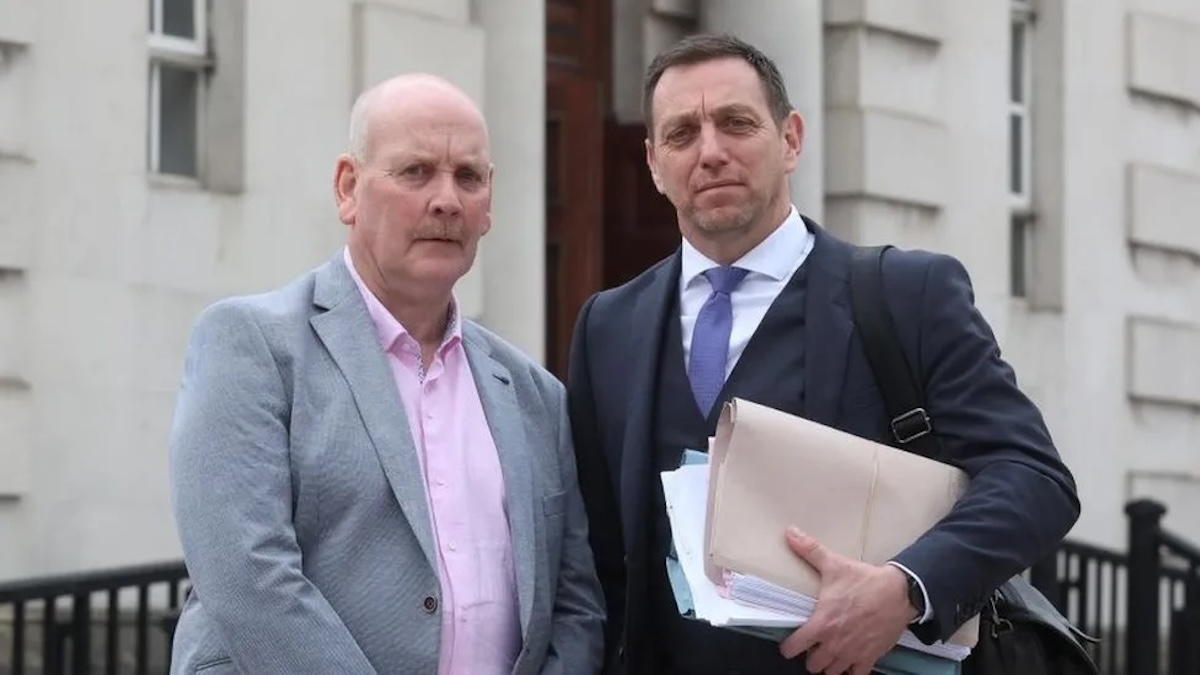
A man wrongly jailed for life over an IRA attack nearly 50 years ago has had his convictions quashed by the Court of Appeal.
Senior judges ruled that Patrick Thompson’s murder convictions were “unsafe’’ due to false statements used against him at his Crown Court trial.
Four British soldiers died in an IRA landmine explosion near Forkhill, south Armagh in July 1975.
Mr Thompson (pictured, left) was subsequently arrested driving a car as he matched a description given by another soldier.
During RUC interrogations, Mr Thompson was repeatedly and brutally punched and kicked in the ribs and subjected to a number of torture techniques.
He was forced to stand against a wall, made to do press-ups and subjected to verbal abuse. A plastic bag was put over his head for up to a minute and tied with a belt, leaving him feeling dizzy, panicked and gasping for breath.
He denied any role in the attack, but was nevertheless found guilty of an involvement and IRA membership. He was handed life sentences of 30 years and was only released in March 1992.
Despite presenting evidence of inhuman treatment to extract a confession, an initial appeal against conviction was unsuccessful.
Now aged in his seventies, Thompson mounted a new bid to clear his name, and was supported by the Criminal Case Review Commission (CCRC).
The CCRC cited “compelling evidence’’ which called into question the credibility of a senior RUC detective who questioned Mr Thompson during his arrest.
At his appeal hearing, defence counsel Frank O’Donoghue KC told the court that Mr Thompson was wrongly convicted on the basis of his alleged confession to an “irredeemably tainted” senior RUC man.
He pointed to the same RUC detective’s involvement in misconduct years later.
“He was exposed as someone whose evidence could not be relied upon in confession-only evidence cases relating to serious alleged terrorist criminality involving murder,” he noted.
“He was prepared to tell the court untruths in a convincing manner so that experienced judges believed he was an impressive witness - that strikes at the very heart of the integrity of the criminal justice system.
“It is important to Mr Thompson when he says ‘I served 16 years in prison, I was not guilty but I was assaulted in custody and this confession was beaten out of me’.”
Giving the judgement of the court on Monday after almost five months deliberation, Judge Siobhan Keegan said: “We have carefully considered all of the evidence and documents in order to reach our final view.
“It boils down to a very simple fact in that the detective inspector who took the confession was clearly not a man of truth or integrity.
“The detective inspector is a dishonest witness who would not have withstood the scrutiny by the courts in 1975 or now due to his ability to falsify his evidence.
“Having considered all of the evidence, the balance falls in favour of the appellant and we cannot regard the convictions as safe. The convictions will now be quashed.”
Speaking afterwards, Pádraig Ó Muirigh, of Ó Muirigh Solicitors, said: “In this case there was a huge human cost for Mr Thompson and his family.
“Mr Thompson’s alleged admissions should never have been admitted in evidence at his original trial.”
PAUL DUFFY
However, a man who was coerced into pleading guilty to the manslaughter of two alleged informers executed by the IRA has lost a bid to have his conviction overturned.
After 13 brutal interrogations, Paul Pius Duffy maintained his innocence and denied any role in IRA activities – but ultimately confessed to a lesser charge of taking part in events surrounding the killings in Belfast back in September 1985.
Defence lawyers argued that he was subjected to exhaustive sessions at the notorious Castlereagh interrogation centre which were likened to a form of psychological torture. He ws threatened and pressured into a state of mental distress and exhaustion.
However, the Court of Appeal insisted that the 65-year-old had failed to establish a valid case of ill-treatment.
Justice Siobhan Keegan said: “The undeniable truth is that the appellant made his own free choice to plead guilty having been offered reduced charges.
“He may regret his choice now, many years later, but that is not sufficient to overturn a conviction.”
![[Irish Republican News]](https://republican-news.org/graphics/title_gifs/rn.gif)
![[Irish Republican News]](https://republican-news.org/graphics/title_gifs/harp.gif)

